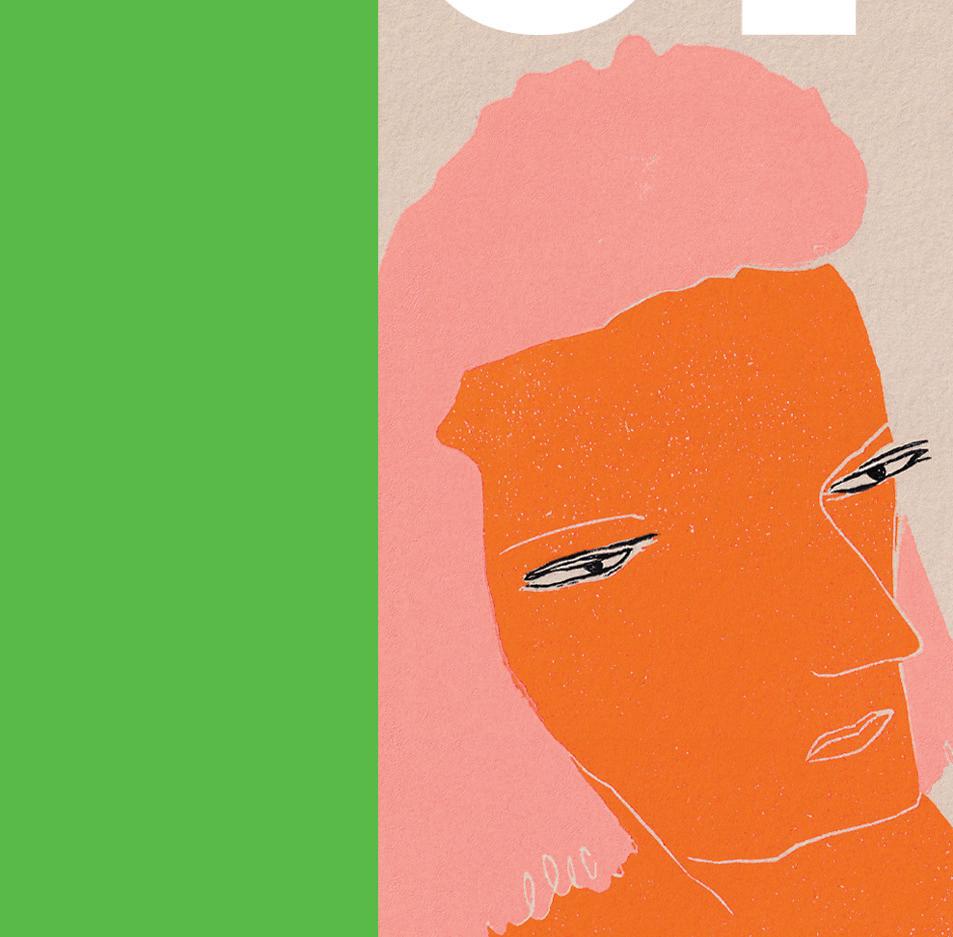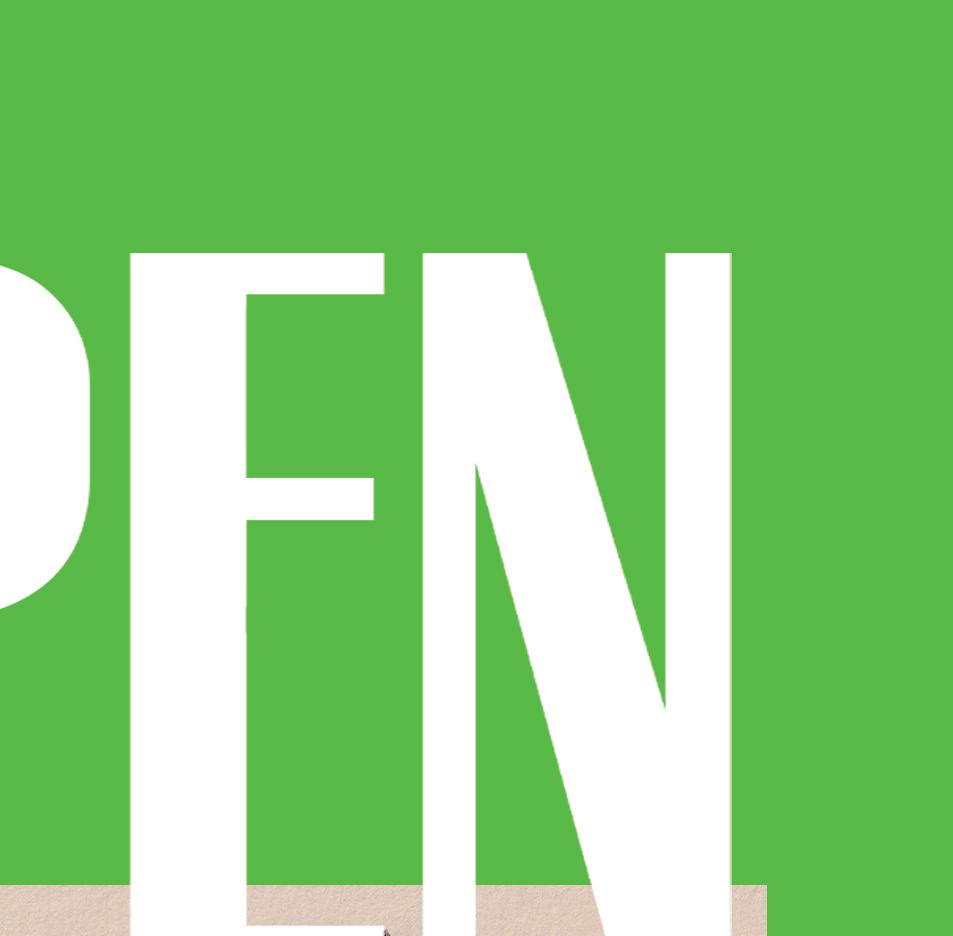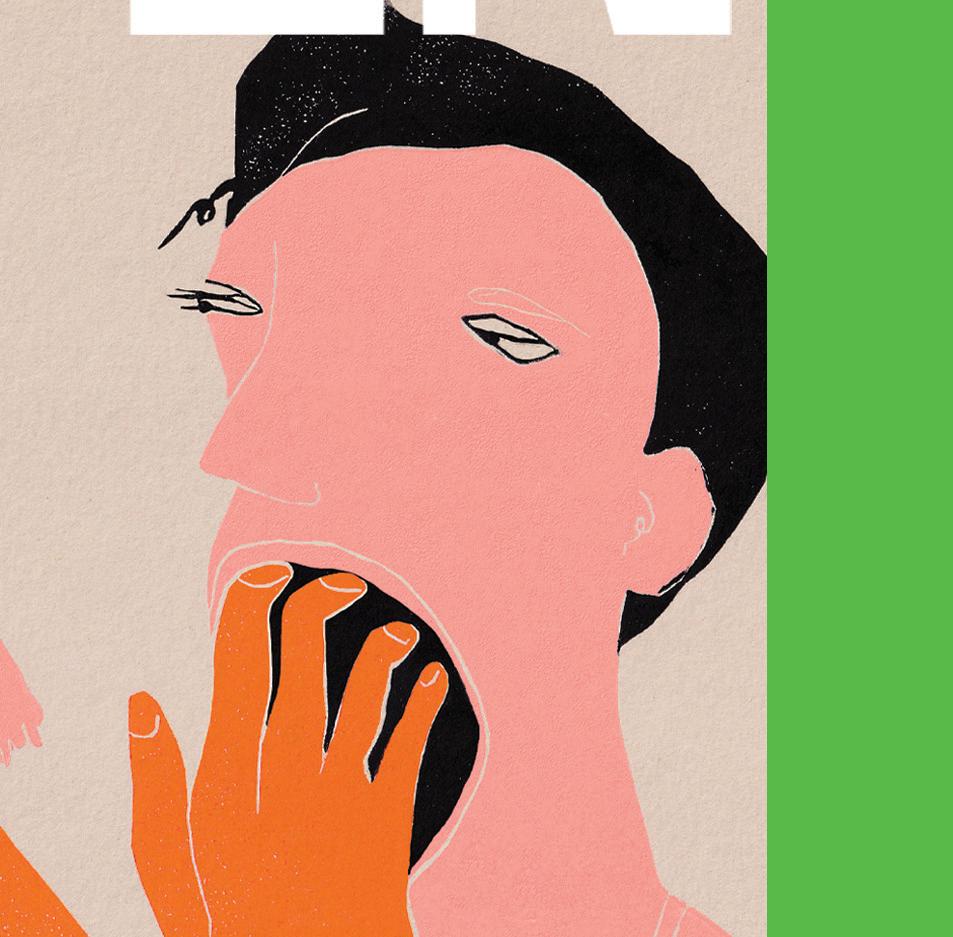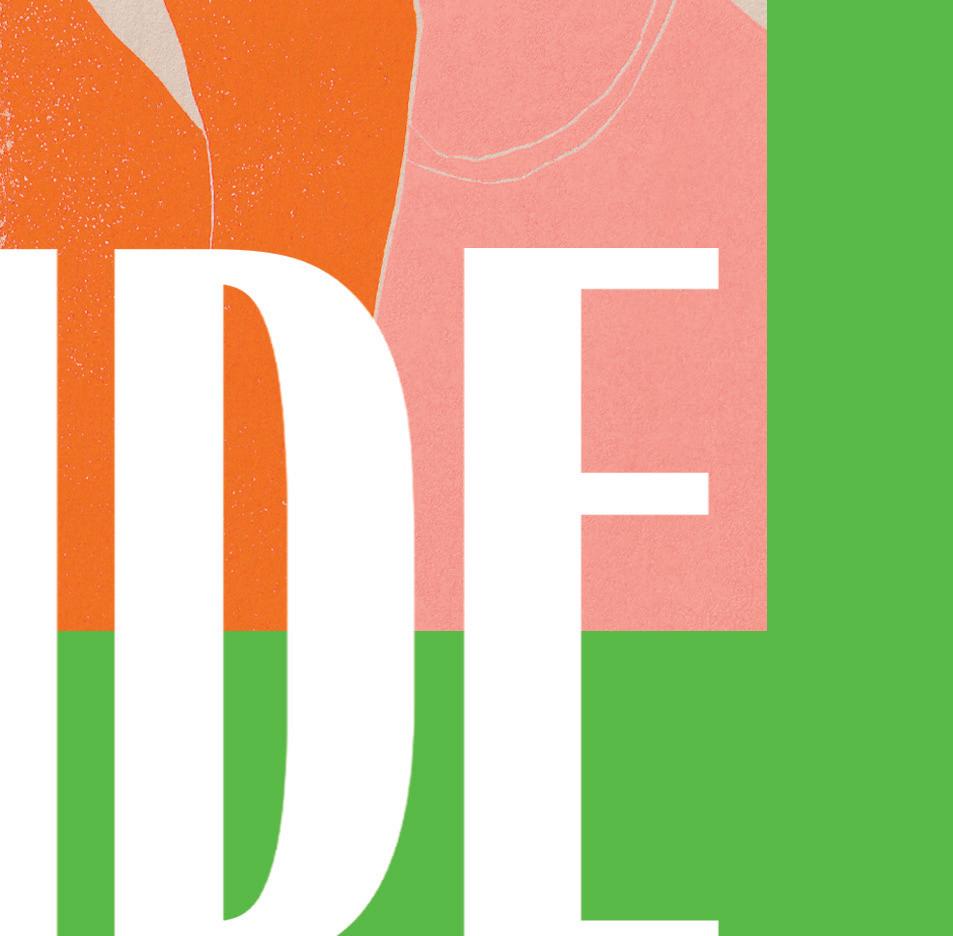
















Harvill, an imprint of Vintage, is part of the Penguin Random House group of companies
Vintage, Penguin Random House UK, One Embassy Gardens, 8 Viaduct Gardens, London SW11 7BW
penguin.co.uk/vintage global.penguinrandomhouse.com
First published in Great Britain by Harvill in 2025 First published in the United States of America by Abrams Press in 2025
Copyright © Jessica Gross 2025
The moral right of the author has been asserted
This is a work of fiction. Names, characters, places and incidents are products of the author’s imagination or are used fictitiously. Any resemblance to actual events or locales or persons, living or dead, is entirely coincidental.
Penguin Random House values and supports copyright. Copyright fuels creativity, encourages diverse voices, promotes freedom of expression and supports a vibrant culture. Thank you for purchasing an authorised edition of this book and for respecting intellectual property laws by not reproducing, scanning or distributing any part of it by any means without permission. You are supporting authors and enabling Penguin Random House to continue to publish books for everyone. No part of this book may be used or reproduced in any manner for the purpose of training artificial intelligence technologies or systems. In accordance with Article 4(3) of the DSM Directive 2019/790, Penguin Random House expressly reserves this work from the text and data mining exception.
Printed and bound in Great Britain by Clays Ltd, Elcograf S.p.A.
The authorised representative in the EEA is Penguin Random House Ireland, Morrison Chambers, 32 Nassau Street, Dublin D02 YH68
A CIP catalogue record for this book is available from the British Library
ISBN 9781787305021
Penguin Random House is committed to a sustainable future for our business, our readers and our planet. This book is made from Forest Stewardship Council® certified paper.
It was on one of those unreal early-summer days, the window boxes violently in bloom, that our merger began. As I walked, I ran my digital recorder as I did constantly, collecting sounds the way other people collect stamps. A bus hissed and screeched. Someone yelled, “Yo! Shithead!” Playground swings creaked on their hinges. A dog retched and a child cried out, “Tata bawfed!”
A woman approached, icy blond, with a face cut into impossible angles and shrouded in a pair of oversized hexagonal sunglasses. Her shapeless shift dress still revealed her tininess. As she passed, and I pointed the recorder toward the ground to pick up the clack of her derbies on the concrete, I watched her chew a wad of gum as though it had affronted her. It was too bad I couldn’t hold the recorder up to her mouth. You can tell a lot about a person from the way they chew their gum. Her jaw worked in circles, her lips parted—every so often she’d crack it against her teeth, just the way the popular girls in high school used to do it. She was probably loved. Her footsteps receded. She hadn’t even looked at me.
The route to the food pantry where I volunteered took me past a restaurant with sidewalk dining, where couples and girlfriends brunched with grating merriment. People squealed greetings over the clanking din of forks and knives, and one blessed diner said, “I want to eat her face.” A hacking cough wafted from an open window. A
teenage couple strolling hand in hand tried to kiss while walking, then laughed when they missed each other’s mouths.
As I watched the two of them, I regretted having made myself look as crappy as possible. I had, I admit, begun volunteering in hopes of meeting a man. Throughout my twenties I’d tried various gambits: I’d gone to open houses for expensive apartments across downtown Manhattan (I only met one man who was single, who also repeatedly used the phrase “right on”); reserved a seat in the movie theater next to an open spot on the aisle, hoping it would be claimed by a solo moviegoer; brought a book to my neighborhood bar. Failing to strategize, I brought the novel I actually happened to be reading—Tessa Hadley’s Late in the Day, a tender exploration of marriage—which, at the bar, two different women interrupted to tell me they’d loved. On my next attempt, I instead brought a book on the history of geometry that I’d received from a coworker; an excitable older man approached me to explain that the ancient Greeks had written the first-ever mathematical proofs. (I knew this, as I had just read it.)
While these forays were unsuccessful, they made for entertaining stories at my expense. “Why don’t you try crashing a funeral?” my oldest sister, Romi, asked. “I hear tons of people meet at those.” I laughed along. She’d been with her husband since college.
By my thirties I had figured out that volunteering gave me the best chance yet of meeting someone kind who liked other people, qualities I’d recently decided to prioritize in a mate. And unlike fake apartment hunting, which left me feeling desolate, ladling out food at a soup kitchen or reading bedtime stories to children at a recreation center was a really nice way to spend time. For a few years I’d hopped from one New York Cares opportunity to another, but early in the summer, I’d lucked into a gig at a food pantry not too far from where I lived. Unloading cans and packets onto the shelves had a lulling
rhythm, the mostly consistent group of volunteers had a casual intimacy that I slipped into without too much difficulty, and the guests who came once we’d fully restocked the shelves became familiar to me over the weeks, lending my Sundays the pleasurable comfort of returning home.
Today I’d dressed ugly, in some hometown youth choir T-shirt that someone had left in one of my college dorm rooms and cutoff shorts I’d made from a pair of baggy jeans, as if to prove to myself that I was really volunteering because I was so selfless, or perhaps to forestall disappointment. My singlehood had been a nearly lifelong era, punctuated by rare, swift romances. Mostly I’d lusted from a distance. At middle school sleepovers, I’d begged my friends to tell me everything about what kissing felt like, how the two sets of lips moved against one another, how each person knew which way to turn, what another tongue felt like in your mouth. As we got older, even before I’d kissed anyone, I’d had friends giving blow jobs, and I needed to know all about that too: what penises looked like, how they tasted, how hard “hard” was, what to do with your lips and teeth and tongue. Was it true that boys’ pupils got huge when they were horny? Was it true that when boys jiggled their legs, it meant they were trying to conceal a boner? I dreamed of pressing my whole body along the length of a boy’s. Yet whenever one was interested, I found myself running away.
My adulthood, too, had unfurled in long dry spells of yearning. It seemed to me I could never really access men, but perhaps it was that I found it hard to let them access me. It was still that childhood compulsion to flee. I worried at times that I was incapable of being in a relationship that lasted longer than a month or two, or that there was some secret part of me, deep inside, that wished to be single forever. Was my discomfort with dating possibly a discomfort with any sort of exposure at all?
Maybe this is why I was drawn to radio—because it offered intimacy with parameters, and at a distance. Not only that, but at work, I was in control: the intimate revelations came from my subjects; my only role was to elicit their confessions. Even recording people on the sidewalk or in casual conversation, then listening later to the tapes I’d made, was a way of marshaling chaos into order, and winning for myself after-the-fact dominion.
Usually I listened to my recordings all the way through, playing them while I was washing the dishes or folding laundry or cooking, as though they were podcasts. My intent was, at least in part, to amass a library of sounds: If I came across tape I could thread into a radio piece as background noise, I would jot the timestamp down in my phone or in my little red notebook, if it happened to be near, and bounce the clip later on. With these kinds of recordings—street noise or restaurant din or laughter in a park—I had no problem excusing my habit, given that it was for work, and besides, it wasn’t hurting anybody. It seemed far more innocuous than taking photos of strangers with a smartphone and posting them all over the internet. The be-derbied woman I’d taped on the street would be none the wiser.
Secretly recording my everyday conversations, though, was another matter. I tried to convince myself that this practice, too, was a necessary or at least helpful part of my job. Years earlier, my voice—more nasal on tape than it sounded to me in life—had made me wince, but I’d used the recordings to work on my speech, to deepen and round it, to make it more professional.
But I didn’t just use the tapes for work. I also scrutinized my social performance, noting missed opportunities for bon mots and practicing retorts, and studied details my friends had shared that I could refer back to in later conversations. As a result of this strategy, I’d been told on multiple occasions that I had a “very impressive
memory.” I stored up successful conversations to listen to as company later, fights as potential future ammunition. (I’d never played back a tape of a conflict to prove anything, and promised myself I never would, but I didn’t delete them, either. They were my rainy day fund, and having them around gave me solace.)
Ultimately, I couldn’t stop myself. It was something I’d been doing since I was a child, and I felt no more capable of quitting it than a binge eater does ice cream. I reasoned that, unlike with my tapes of street noise, I never used my recordings of conversations for anything; they were entirely private. Even if I’d wanted to use them for a radio piece, the sound quality of voices recorded from my pocket wasn’t anywhere near good enough. I’d need to place the recorder in plain sight, as close to whomever I was talking to as possible, to mitigate the interference of background noise. So what could be wrong?
Yet I kept the practice to myself. At least, then, I did.
The food pantry was in Brooklyn Heights, at a beautiful church at the end of the street: brownstones layered like expensive cake, trees bursting out of their fenced-in pockets of dirt. Even the air conditioners hanging out of the windows hummed more quietly than they did in Clinton Hill, where I lived. From down the block, I spotted Martine, who’d been the shift leader for years, holding a box in one arm and pulling a ring of keys out of her back pocket. Today she wore high-waisted shorts, a crop top, and chunky white sneakers: now that was how you were supposed to dress on a Sunday. No wonder she had a husband. She’d gotten a new haircut since last week— buzzed on one side—and though I’d seen it in the photos she’d posted, it looked even better in real life.
I slipped my recorder into my back pocket as I neared, making sure the microphone was still exposed, and called out a greeting, to
avoid the awkward scenario in which I startled Martine from behind and dissolved into too-high laughter. She waved back.
“Wow, great haircut!” I said, as if I hadn’t seen it online. Though it was pathological to not e-stalk people these days, with acquaintances it was embarrassing to bring up, in person, details of their life you’d ferreted out, even though they’d consciously made them available for your consumption. I’d relearned this my last time in New Orleans, when I’d run into someone I’d gone to elementary school with and asked how her baby’s birthday party—the preparations for which she’d posted in a string of Instagram stories—had gone the week before. The conversation had concluded quickly thereafter, leaving me ashamed. It was as if your online avatar alone was supposed to know these things, and you-in-the-flesh was not.
Martine gave her new hair a sassy shake, asked how my week had been.
I said I couldn’t complain—“Or I can, but I won’t.”
“Girl, same.” What she had to complain about I couldn’t fathom. She and her husband lived in downtown Manhattan; they had met at some bar or other while Martine was in law school and he was working as a hedge fund analyst. (I knew a few of these but somehow still had absolutely no idea what the job entailed, and amused myself by imagining them commanding pens full of hapless hedgehogs.) They’d fallen immediately in love and gotten married within the year. I’d found all this out at my first shift, throughout which I queried, maybe interrogated, Martine and her husband, who were volunteering together, frequently touching each other on the arm or back or waist, sometimes murmuring to each other and laughing at their private joke. They looked a bit like siblings, I’d thought, and wondered if they ever mused about it or if they’d even noticed. I wanted to scrutinize their seemingly perfect life in the hopes it would infuse me, through osmosis, with similar fortune.
But as I’d listened to my recording of the conversation the night of that first shift, my optimism had curdled into an angry lust. The contrast between Martine’s life and mine was too extreme: I shared my two-bedroom with a twenty-four-year-old woman named Ava I mostly hated but felt compelled, for some reason, to pretend I adored. I invited her everywhere, even though she rarely came and had never invited me (which only made me more ragefully determined to win her over). Ava had an overabundant social life: a Saturday might hold day drinking in someone’s Bushwick backyard, a museum date with a friend, dinner with other friends in Williamsburg, and then some party or other. In bitter moments I wondered why it was that she needed quite so many friends, something that made me suspicious she was intent on not becoming intimate with a single one. Mostly, though, I was jealous. Friends my age had increasingly coupled up, leaving me stranded. Unsure what else to do, I continued inviting people to do things with me as I had in my twenties: I’d email a few dozen people asking if they’d like to join for any of the events I’d planned for the summer (Green-Wood Cemetery tour one weekend; karaoke the next; paint-your-pet’s-portrait, anyone?). I started something called the Moon Club, where I set out watercolor paints and we all, literally, painted the moon in whatever phase we found it in—really an excuse to drink several bottles of wine and talk about whatever was happening with our bodies lately. (On one visit, my mother found a pile of terrible moon paintings I’d stuffed under my coffee table and demanded I hand them over to her; a couple months later, a package of framed moon paintings arrived in the mail.) For my thirty-third birthday, I picked three Saturday evenings a few weeks apart and invited thirty-three friends to choose which evening to come to: “Feel free to bring a guest!” My goal was to introduce people I loved to each other, which did happen, but also to “meet someone,” aka someone to date, aka a boyfriend, aka
my soulmate, which I did not. (I did, however, pawn moon paintings off on my guests as joke party favors.) Increasingly fewer people came to my events—their partners needed them, their babies needed them, of course I understood, next time!—but I forged on like a deranged mountaineer. When coupled friends couldn’t make it to the plans I proposed, they’d often reply, “sorry .” The insertion of the emoji gave the apology a pitying flavor—not I wish I could, but rather, I can’t, and how it’s going to hurt you!
I took the box from Martine so she could unlock the door and trailed after her into the building. Our footfalls echoed through the old church. The box—full of records of inventory, X-Acto knives, paper and markers for signage, guest check-in sheets—went on a table in the way back. Martine idled there with me while we waited for the other volunteers and a truck full of the nonperishables a local business had donated. I asked Martine whether her husband was coming, wondering if they’d fought and he’d bailed, but he was just stopping by the hardware store for a few extra X-Actos on the way over.
“Quick, show me photos of Felix before everyone gets here,” Martine said—I’d mentioned my dog the first time we’d met and every shift thereafter. Gratefully, I obliged: Felix curled up on the bed, curled up on the couch, curled up on the rug, and then, in the park, beaming with a stick in his mouth.
Martine’s husband arrived, and they kissed: showy, I thought, after such a brief time apart.
The others trickled in: Kam and Noah, mid-fifties, who’d been on this shift for years; Binita, newish, whom I was in the process of befriending; Dahlia, who kept her headphones in throughout the shift and was, by my account, our only aloof member. Binita and I exchanged tentative new-friend back-and-forths—I told her she smelled like flowers; she showed me her perfume and I held out my
wrist to request a spritz. Martine called to us that the truck had arrived, and we went out to meet it.
I waited until the others had cleared out with their first load of boxes before climbing inside. Transferring heavy boxes to the back of the hall was my least favorite part of volunteering here. I lingered alone in the truck, scanning the remaining boxes’ neat labels, looking for a light one. Not canned soup, not canned fish, not peanut butter or loose dried beans. Jam: heavy and fragile. Tea: bearable. I started gingerly shimmying the package off its pile.
“Hey, let me—”
The voice from the street surprised me so much that I yelped and dropped the tea.
“Fuck!” I said, but then started laughing, and he did too. I turned to look at him.
When our eyes met, we stopped laughing.
Thick eyebrows, dark unruly hair, a delicate and beautiful face. His eyes were soft and boyish, giving the sense he was not quite an adult, not yet capable of navigating the world on his own.
“I was going to say, ‘Let me help you with that,’ ” he said. He had his hands braced against the truck bed, and I could see the bluish tint of veins threading through his forearms. The skin there looked soft and hot.
I noticed that my toe was throbbing; the box of tea had fallen on it.
“Ow,” I said, belatedly, as though speaking to him through a dream.
He hoisted himself into the truck, swinging one foot up between his hands like he was getting out of a swimming pool. His shorts hiked up his leg, and as I watched him come up and over the edge, my eyes caught on the tendon that hitched onto the back of his left knee and ran along his thigh. Above was a soft, shadowy hollow. My heart started to pound. I felt crazy.
“Need help?” I asked.
“No,” he said, and my stomach lurched. “But I want it.”
We manipulated the boxes in silence. I observed, covertly, the muscles flexing in his arms as he tore the tape from a box and collapsed it, his hair swishing against his forehead as he flung the cardboard to the side. As he focused, I let myself stare openly at his face: beautiful more than handsome, its angles elegant and precise, but with those boyish eyebrows and hair. He grabbed another from the pile and began again. Glanced up at me. I looked quickly away. He asked what I did for work.
“Radio producer,” I said. “And you?”
“Tell me more about it.”
“I asked first.”
He raised his eyebrows.
So I told him I was a radio host at WNYC. My show, The Process, interviewed writers in the middle of working on a project, rather than after it was completed—in the gunky period, rather than the shiny one. The show was a counterargument to timeliness; I explained to Theo that in most cases journalists, even cultural ones, need a timely “peg” for each show or article. The window in which any work is considered timely is laughably narrow; in the few weeks surrounding a book’s publication, the author gives a dozen different interviews, says the same thing each time, and then disappears. I knew a critic who’d held on to an essay about a novel she’d loved, which had come out five years prior, until the author died and it was again relevant enough to publish.
“Seriously?” Theo had paused his work as I’d spoken; focused on me, he probed between his bottom teeth with his tongue. I wondered—already, in that moment—what that gap would feel like against my finger, my lips, my own tongue.
“All hail the peg,” I said.
My show was the rare exception. I’d interviewed Nora Lee, who hadn’t published a book of poetry in a decade; Tory Ann Waters, who was undertaking the epic proj ect of translating all of Tolstoy; Adelyte Müller, an unsubtle but impressively prolific novelist; and Tatum Bly, a science journalist who’d taken a hiatus after a book of his was widely panned. As I spoke, I continued peeling tape off of boxes, folding them flat, and throwing them to the side. I had started sweating again as soon as I’d come outside and hoped that Theo hadn’t noticed, or that if he had, he didn’t care. The sheen along his arms only made me want to lick them.
Even if writers weren’t ready to describe in granular detail what they were working on, I said—it sometimes happened—they’d usually tell me how it was going, the phase of the process they were in, if they wrote at a desk or in bed, with a pen or a laptop.
Theo told me he hardly ever listened to the radio for lack of time, but if he had, he was sure he would’ve heard of my show. “Is it okay if I listen?” he asked. He crushed a box between his hands and flung it onto the pile, his shirt fluttering up for a moment. Yes: there was a slash of dark hair.
“Of course,” I said, as a mixture of glee and terror rose in me. Part of me desperately wanted him to listen to every episode I’d ever made; the other part felt already embarrassed. “Now your turn,” I said.
“I’m a surgeon.” He flattened another box, threw it onto the mounting pile. Muscles flexing in turn, hair swishing. An image solidified in my mind of him bent over a body, flashing metal tool in hand, hair screening his face. No; he probably wore a surgical cap. I revised the image. Did he probe his teeth with his tongue as he made the incision?
“What kind of surgeon?” I asked.
“Colorectal.” I revised the image again, moving Theo down from the patient’s head, where I’d placed him initially, to his gut. Digging the blade into the soft flesh, eyes squinted at the bloody slice.
“Do you like it?” I asked. “Cutting people open.” I wondered what sound it made, slicing into someone’s skin.
“You really want to know?”
“I’m not squeamish.”
“I love it,” he said, then looked at me, smiling. He tossed another box onto the pile. “Is that gross?”
“Not unless it’s in a murdery way.”
He laughed, ran his hand through his swoosh of hair. “No, not like that.”
“Is it that you like seeing what people look like, inside?” I found myself squinting at him, the way I did when I asked an interviewee a question I really wanted the answer to. Quickly I rearranged my face, softening it as though meditating, but Theo hadn’t flinched or looked away under my scrutiny.
“In the beginning, it was,” he said, a little smile curling the corners of his lips as he remembered. “Before I got used to it. When I was an intern, an attending asked if I wanted to reach inside a patient’s belly, and I felt like a kid who gets to stick his hands into a bucket of worms.” He tossed a box and grabbed another. “I think that’s the difference between me and all the doctors who don’t want to be surgeons.”
“What does it feel like?”
“Warm,” he said. “Squishy, and slippery. There’s fluid in there, and a layer of fat that covers all the organs. Which are mostly bowel: slippery, shiny, very soft coil, over fifteen feet long.” His guttural voice had sharpened, as though thinking of the body cut any excess from his speech.
I realized I’d been standing still, listening to him, with a box in my hands. I ripped the tape off and squeezed the cardboard flat.
“It sounds like pasta,” I said.
“That’s just what it looks like. Really thick, pink pasta. Above are the liver and the stomach. The more you dig, the more you’ll find.”
“What’s on your hand when you take it out of a body?”
“Some slime; maybe a little oily stuff. Like if you’d stuck your hand in a pot of stew.”
“Cool,” I said dumbly. I threw a box to the side, causing my hair to fall in front of my face; I tucked it back behind my ears, which I knew made me look prettier. Covertly, I dabbed at my upper lip, where beads of sweat had accumulated. I wanted to ask what he thought my insides looked like.
“It’s so cool,” he said. “But it feels different now than it used to— more routine and relaxing, like how people describe knitting. When you’re knee-deep in an operation you really do need to keep your eyes on it at all times. So on TV, when people say, ‘Hand me the scalpel’? That’s real. That’s what I love now: focusing so hard the rest of the room falls away.”
The door to the building creaked open, startling us both. Martine called me back indoors to help with a guest who’d asked for me. Theo stayed outside; there were still plenty of boxes to break down. I kept my eye on the back door throughout the rest of the shift—as I restocked shelves, helped guests find items and carry their baskets, took inventory—silently pleading with Theo to come back inside. I’d have to run home to walk Felix as soon as the shift ended, so I wasn’t sure I’d be able to say goodbye. The shift sign-in book was right by the door and, after a moment’s hesitation, I copied down Theo’s number.
At noon, I found Martine chatting with Binita by the door and told them I had to dash, as usual.
“Who else walks their dog four times a day?” Martine joked. “The ‘lunchtime walk’?”
“How is Felix?” Binita asked.
From Theo, who’d approached from behind: “Who’s Felix?”
I waited a beat, as if testing him: Would you mind if I had a boyfriend? His expression was unreadable. I watched him swallow, which could have meant nothing or everything.
“My dog,” I said. Did he breathe out then and smile a little?
Let’s say he did.
Felix was waiting by the door, his whole butt wagging. He’s a shaggy mutt, fur sprouting from the ridge of his nose, with one pointy ear and a floppy one that used to wave in the air like a little flag as he ran. He pressed his head between my calves. I scratched the crown of his head, his favorite part, and behind his ears, his other favorite part. He made a noise of assent deep in his throat that seemed an incarnation of my own desire.
We walked. I thought about Theo. I’d been imagining him nonstop since I left the food pantry for the subway: as I looked briefly back over my shoulder, though I knew Theo had gone back inside for his things; as I swiped my MetroCard, missing it four times before it hit; as I walked through the turnstile, the grimy metal pressing sensuously against me; as I waited on the platform, as I sat on the train, as I walked home and ascended the stairs and unlocked the door. The sweat stains beneath his armpits. His hand, briefly, on my back. His tendon, and the shadowy dip above it. I had fixated on men in this way before, and still fed on the details when I closed my eyes—the thick parentheses of this one’s eyebrows, the smokerhoarse quality of that one’s voice—but rarely had I felt that maybe, just maybe, the fixation was also going the other way.
Back home from the walk, I went straight to my room with Felix and closed the door—Ava wasn’t in the apartment, but she could return
at any moment. I plugged my recorder into my computer and downloaded the file from the shift. Three hours and forty-seven minutes. I did this every time I recorded anything, but downloading the Theo file felt intrusive in a particularly sickening-thrilling way. I sank to the floor as the file transferred, pulling Felix into my lap, his dog-limbs askew. He indulged me, nudging his head into the crook of my neck.
I was painfully aroused. I wondered if I should masturbate with Felix on my lap—he was usually in the room with me, anyhow, so was this really different? Sometimes, he’d look up at me from the floor as I touched myself in bed, and we’d lock eyes. I’d read on the internet about a woman who’d put peanut butter between her legs for her dog to lick off. That felt like a step too far, but when it had got to be a long time since I’d had sex, the knowledge that I could gave me a sense of calm. I wondered if men put peanut butter on their penises, or if they worried about being bit; but when Felix licked peanut butter off a knife, he never bared his teeth, so it was probably not an issue. I had noticed, when I’d remove my vibrator from my vagina after coming, that Felix’s nose would twitch interestedly in its direction. By this point it had become a ritual: as soon as I’d come, I’d offer him my vibrator to lick. So, in a way, he had been between my legs, by proxy—like kissing a tallit to touch the Torah.
The computer dinged: the file was ready. I lifted Felix from my lap onto the floor beside me and reached toward my laptop. I fastforwarded through the walk to the pantry (bus, swings, barfing dog), through my conversation with Martine, through my chitchat with Binita, until I could hear Theo’s voice. It had more air in it than I remembered, closer to a clarinet than a trumpet. I was going to say, “Let me help you with that” . . . Is it okay if I listen? . . . The more you dig, the more you’ll find. . . .
It was hard to touch myself over my shorts, but I didn’t want to take them off and commit to coming. Instead I lazily stroked myself